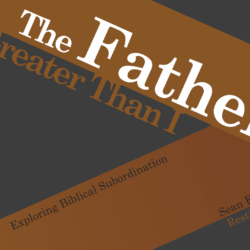At the 2021 Greek & Hebrew for Life Conference, William Varner of The Master’s University asserted that one reason why New Testament scholars and students should care about and study the Apostolic Fathers is because they provide evidence for the Trinity prior to Nicea. He mentioned a professor, “one of our own,” who claimed the early Christians did not believe in a Trinity theory prior to a.d. 325. Those who follow Restitutio, will recognize a veiled reference to Bill Schlegel whom I interviewed in 2018 (Master’s University Prof. Finds Son of God, Loses Job). Furthermore, I have gone on the record making the case that the kind of Trinity theory Varner, MacArthur, and evangelicalism embraces is nowhere to be found prior to Nicea in my 2019 paper “The Trinity before Nicea” (also available on Youtube here). In that work, I responded to the various cherry picking quotations of Matt Slick in his article, “Early Trinitarian Quotes,” in which he made the bold and easily refutable assertion that Polycarp, Ignatius, Justin, Irenaeus, Tertullian, and Origen all believed in the Trinity. However, since the witness of the ante-Nicene fathers is so vast and voluminous, I did not get around to addressing the text Varner brought up from 2 Clement. In what follows, I’d like to briefly respond to the audacious claim that the author of 2 Clement believed in an kind of Trinity theory.
We begin with the single text Varner cited:
2Clement 1.1
Ἀδελφοί οὕτως δεῖ ἡμᾶς φρονεῖν περὶ Ἰησοῦ Χριστοῦ ὡς περὶ θεοῦ ὡς περὶ κριτοῦ ζώντων καὶ νεκρῶν καὶ οὐ δεῖ ἡμᾶς μικρὰ φρονεῖν περὶ τῆς σωτηρίας ἡμῶν.Brothers and sisters, we must think this way about Jesus Christ as about God, as about (the) judge of the living and the dead. And we must not think little about our salvation.
We can read this text several ways. In fact, when I first encountered it, I thought it was good evidence against the notion that the author of 2 Clement thought Jesus was God. Why else encourage Christians to think of him as they already thought about God? Varner’s point, however, was that this text provides evidence of at least an incipient trinitarianism. Now, if 2 Clement said, “We must think this way about Jesus Christ as God,” instead of “about Jesus Christ as about God,” that would indicate the author’s belief in some form of (probably subordinationist) deity of Christ. However, the construction here lends itself much more towards the opposite. Christopher Tuckett agrees when he wrote the following in his commentary on 2 Clement:
“[I]t is doubtful if Christology in itself is the main focus of attention here. The address is focused not so much on Christology for its own sake, nor on what Christ has achieved through his life and death as such; rather, it is Jesus’ status as judge that is crucial, and the resulting consequences for practical living for the christian. In any case, the ‘identity’ between Jesus and God implied here is probably more a functional identity than an ontological one.” -Christopher Tuckett, 2 Clement: Introduction, Text, and Commentary (Oxford: Oxford University Press, 2012), 128.
Indeed, the point is not to elevate Jesus to the status of God nor to establish some metaphysical doctrine of consubstantiality, but rather to express the simple truth that when it comes to judgment, Jesus plays the role of God. This could be because he just is God or a lower divinity or it could be due to the fact that Jesus said, “All authority in heaven and on earth has been given to me” (Matthew 28.18). Jesus does have the authority to judge the living in dead, but it has nothing to do with his nature; it is because God granted him that authority as the prophesied Son of Man.
We find in John 5 another text that helpfully explains this:
John 5.25–27
25 Truly, truly, I say to you, an hour is coming, and is now here, when the dead will hear the voice of the Son of God, and those who hear will live. 26 For as the Father has life in himself, so he has granted the Son also to have life in himself. 27 And he has given him authority to execute judgment, because he is the Son of Man.
Yes, Jesus is the judge we will face on the last day. The Father has granted Jesus the role of resurrecting and judging because he is the Son of Man. As laid out in Daniel 7.13-14, Jesus’ function as the Son of Man is to receive authority from the Ancient of Days and to rule over all nations forever. There’s no hint of Jesus actually being God here. Quite the opposite is true. God doesn’t directly take on this role, but confers it on his agent.
Let’s get back to 2 Clement 1.1, which said we should think of Jesus as we think of God as of the judge of the living and the dead. This last phrase “as of the judge of the living and the dead” clearly qualifies what the author has in mind here. He is not saying we should think of Jesus as of God in every sense, but in the particular sense that he judges. Last week I coordinated a youth camp. I could have said to the teenagers in our first meeting, “Think of me as you think of your father for the week, as one who has authority.” Would anyone hearing this perceive in my statement a claim to ontological oneness with each one’s biological fathers? The statement is obviously functional not ontological. They aren’t concerned about my essence, but my authority!
What’s more, we don’t have to guess what 2 Clement teaches about God’s identity. He clearly specifies that the Father is the only God in the last verse of the book.
2 Clement 20.5
Τῷ μόνῳ θεῷ ἀοράτῳ πατρὶ τῆς ἀληθείας τῷ ἐξαποστείλαντι ἡμῖν τὸν σωτῆρα καὶ ἀρχηγὸν τῆς ἀφθαρσίας δι᾽ οὗ καὶ ἐφανέρωσεν ἡμῖν τὴν ἀλήθειαν καὶ τὴν ἐπουράνιον ζωήν αὐτῷ ἡ δόξα εἰς τοὺς αἰῶνας τῶν αἰώνων ἀμήν.To the only God, invisible, Father of truth, who sent out for us the savior and founder of incorruptibility through whom also he manifested to us the truth and the heavenly life, to him be the glory for ever and ever amen.
This statement clears everything up quite nicely. The only God is the invisible Father of truth. This one sent the savior and founder of our salvation. Like virtually all of the Apostolic Fathers (with the possible exception of Ignatius), 2 Clement does not confuse God and Jesus. He holds to the clear delineation between the supreme God above all and the savior he sent for us. Lastly, I would like to conclude with the words of no other than William Varner himself who admitted the following in his own commentary on 2 Clement:
“While this ‘thinking’ about Christ as ‘God’ appears as a rather bold theological declaration, the additional statement places it in a functional context. Clement does not describe Jesus as the second person in the God-head (an incipient binitarianism) but invokes Jesus as God in his role ‘a judge of the living and the dead.'” -William Varner, Second Clement: An Introductory Commentary (Eugene, OR: Wipf and Stock Publishers, 2020), 51.
This is what I’ve been saying. The author of 2 Clement “does not describe Jesus as the second person in the God-head” but as playing the role of God (not actually being God) in his judging the living and the dead. Maybe I’m just missing something here, but in the conference Varner used this text, and only this text, to make his case that Schlegel was wrong and the Apostolic Fathers contain evidence of a Trinity theory prior to Nicea. I’m not sure why this contradiction exists, but it is at best confusing and at worst disturbing. In conclusion, we shouldn’t use 2 Clement 1.1 to teach that Jesus is ontologically God. To do so is anachronistic.






So Varner proves himself wrong, but doesn’t recognize it.
The reason protestants like Will Varner have to go searching and scratching for any little tidbit of the “deity of Christ” or the Trinity in 2nd century and following Greek and Latin church fathers, is because of the lack of evidence for such in the Bible.
Goodness Mr. and Mrs. Protestant, open the Bible up to the places where Jesus or the apostles explained that God was a tri-personal being. It’s that simple.
Hello. I came across this posting on a Facebook page and just wanted to share my thoughts. I have to say that you engage in faithful reasoning about the verse and the word meanings involved which is what should be expected of all of us. Yet sadly there are many who carry the burden of a doctrinal/theological dogma and narrative. Based on the excerpt from the commentary by the same man I have to say that he too demonstrated good faithful reasoning in his exegesis and I guess he is asserting or implying that a functional authority is tantamount to a functional deity. But how do you jump from functional to intrinsic and necessary? I see the same flaw in reasoning repeated over and over again by most professinf Christians who say thing like Jesus created so He must be God as if there is no scriptural in between.
What I actually say in the commentary:
“In regard to “Christology,” the pre-existence of the Son is evident (14.1–2), but again it is expressed in His relationship to the spiritually pre-existent Church. Jesus is the one sent to save us and that mission is expressed by God sending the light and his mercy by Jesus’ suffering for us (1.4ff). While the Father sent the Son, Christ stands beside God and should be viewed as divine (1.1). The verbs for calling (1.8; 2.4; 10.1; 16.1) and saving (1.4–7; 10.1) and teaching (4.5; 8.4; 17.3) are all used of both God and Christ with no distinction. In the beginning passage so often noted (1.1), Christ is thought of as God and exercises the eschatological function of being the judge. The familiar Jesus logion of loving one’s enemies is introduced as something that “God says” (λέγει ὁ θεός). The exact relationship is not examined as one would expect in theology, or even in the Gospel of John (20:28–29). It is simply assumed that God and Christ, if they are not identical, are inseparable. In keeping with his functional approach to all doctrines, in his final benediction (20.5) the author not only calls Jesus the savior (σωτήρ) but couples with it the title “pioneer/founder” (ἀρχηγός), a title echoing the preaching of Peter (Acts 3:15) and the author of Hebrews (12:2).”
Of course the final evidence for deity is not the Apostolic Fathers, but the NT. My only point in the lecture is that the deity of Jesus was not invented by fourth century philosophers, but is supported by early second century fathers. The evidence for viewing Jesus as Divine is even stronger in 1 Clement and Ignatius.
This will be my first and last comment on this page. Please do not write me at the email address below. It required me to enter it.
Mr. Varner,
You said – “It is simply assumed that God and Christ, if they are not identical, are inseparable.”
Right. Every agent, when acting in his full capacity as an agent, is considered inseparable from the one whose agent he is. This just is how agency functions.
You said – “The evidence for viewing Jesus as Divine is even stronger in 1 Clement . . .”
I would like to see how you justify this claim.
Varner, is simply a coward. A genuine teacher would encourage debate.
Have you not overlooked the fact that Luke records that Jesus was blasphemed (Luke 22:65) by the Jewish authorities? A careful reading when compared to the other synoptics on that point shows divine blasphemy to be in view, particularly in view of repeated associations of Jesus with the Son of Man in that chapter and its synoptic parallels. You may see my brief article on that topic here: https://scribalkingdom.com/2021/08/21/jesus-the-blasphemer-or-blasphemed.